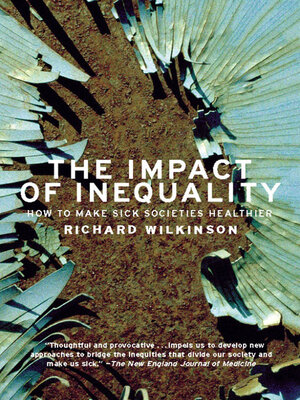
Sign up to save your library
With an OverDrive account, you can save your favorite libraries for at-a-glance information about availability. Find out more about OverDrive accounts.
Find this title in Libby, the library reading app by OverDrive.



Search for a digital library with this title
Title found at these libraries:
| Library Name | Distance |
|---|---|
| Loading... |
A “powerful and provocative” inquiry into the relationship between societies’ inequality and their citizens’ health, happiness and well-being (Lisa Berkman, Harvard School of Public Health).
Comparing the United States with other market democracies, and one American state with another, this book presents irrefutable evidence that inequality is a driver of poor health, social conflict, and violence. Pioneering social scientist Richard Wilkinson addresses the growing feeling—so common in the United States—that modern societies, despite their material success, are social failures. The Impact of Inequality explains why inequality has such devastating effects on the quality and length of our lives.
Wilkinson shows that inequality leads to stress, which in turn creates sickness on the individual and mass level. As a consequence, society suffers widespread unhappiness and high levels of violence, depression, and mistrust across the social spectrum. With persuasive evidence and fascinating analysis, the diagnosis is clear: Social and political equality are essential to improving life for everyone. Wilkinson argues that even small reductions in inequality can make an important difference—for, as this book explains, social relations are always built on material foundations.
“This new book, a wonderful work of synthesis, brings insight into how conditions of society impact on people’s daily lives. . . . It is a stimulating and exciting book.” —Sir Michael Marmot, author of The Status Syndrome
Comparing the United States with other market democracies, and one American state with another, this book presents irrefutable evidence that inequality is a driver of poor health, social conflict, and violence. Pioneering social scientist Richard Wilkinson addresses the growing feeling—so common in the United States—that modern societies, despite their material success, are social failures. The Impact of Inequality explains why inequality has such devastating effects on the quality and length of our lives.
Wilkinson shows that inequality leads to stress, which in turn creates sickness on the individual and mass level. As a consequence, society suffers widespread unhappiness and high levels of violence, depression, and mistrust across the social spectrum. With persuasive evidence and fascinating analysis, the diagnosis is clear: Social and political equality are essential to improving life for everyone. Wilkinson argues that even small reductions in inequality can make an important difference—for, as this book explains, social relations are always built on material foundations.
“This new book, a wonderful work of synthesis, brings insight into how conditions of society impact on people’s daily lives. . . . It is a stimulating and exciting book.” —Sir Michael Marmot, author of The Status Syndrome







